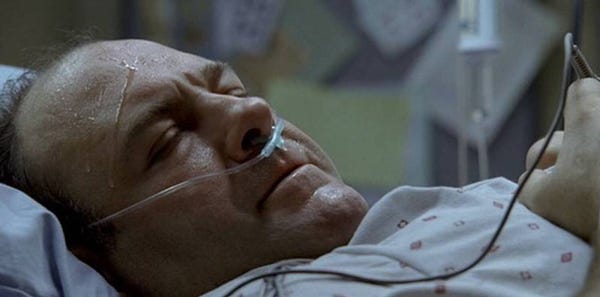Trump's ghastly idea for identifying the Supreme Court leaker
& lots of Zmail on the death penalty
To read this issue in your browser, click on the headline above.
Eric Zorn is a former opinion columnist for the Chicago Tribune. Find a longer bio and contact information here. This issue exceeds in size the maximum length for a standard email. To read the entire issue in your browser, click on the headline link above.
Trump jokes about using prison rape to persuade journalists to disclose their confidential sources
Here’s a transcript of the portion of former President Donald Trump’s remarks at a rally in Robstown, Texas Saturday in which he discusses the leak earlier this year of a draft of the U.S. Supreme Court’s opinion overturning Roe v. Wade.
You have to find the leaker. You know how you find the leaker? … He leaked all about Roe. v. Wade this person leaked from the Supreme Court, never happened.
You know how you find? But they don’t want to mention this because they think it’s so terrible:
You take the writer – because you’re never going to find it, they’ve gone through phone records, it’s been a long time — you take the writer and/or the publisher of the paper … and you say, ‘Who is the leaker? National security.”
They say, “We’re not going to tell you.”
We’ll say “That’s OK, You’re going to jail.”
And when this person realizes that he is going to be the bride of another prisoner very shortly, he will say, “I very much would like to tell you exactly who exactly who that leaker is. It was Bill Jones, I swear! He’s the leaker.” And we got him. But they don’t want to do that. They don’t want to do that. But that’s the only way you’ll find him.”
Trump’s audience laughed heartily at the “bride of another prisoner” line. But expressions of amusement at the idea of prison rape is not by any means a right-wing phenomenon. I’ve seen dozens of jokes on Twitter imagining former Trump adviser Steve Bannon getting sexually assaulted when he serves his four-month prison sentence for criminal contempt of Congress
In “Why Americans Don’t Care About Prison Rape,” as 2015 article in The Nation, Elizabeth Stoker Bruenig reported on studies showing nearly 200,000 detainees a year are sexually violated in U.S. jails and prisons.
We have become a culture that tolerates and potentially lauds the rape and sexual exploitation of hundreds of thousands of people every year, many of them minors, mothers, mentally ill. ... Rape is (widely seen as) part of forcing prisoners to change, it’s what makes learning your lesson in prison scary, and scary prisons are what keep bad people in line. …
The ubiquity of rape in prisons has led to a ubiquity of prison-rape nonchalance in popular culture, which promotes a rape-as-punishment framework and normalizes rape itself. There is no other element of carceral life so frequently referenced in television, film, stand-up comedy routines, sleazy gossip rag headlines and second-rate porn scenarios.
But when we codify primal impulse into popular consensus, we wind up in agreement that rape is sometimes an appropriate punishment. Hatred or indifference to people in prison, therefore, affirms a particularly poisonous view of rape itself: that it has its place in the order of things, especially where badly behaved people are concerned.
Those raped in prison are likely to experience significant long-term trauma that will harm their ability to reintegrate into society, and one of the missions of Just Detention International is to provide appropriate crisis counseling to victims.
Republican President George W. Bush signed The Prison Rape Elimination Act of 2003 to "provide for the analysis of the incidence and effects of prison rape in Federal, State, and local institutions and to provide information, resources, recommendation and funding to protect individuals from prison rape." Studies show it didn’t do much to reduce the incidence of the crime few people seem to care about, but at least Bush made an effort. Trump just jokes about it.
And of course the idea of implicitly threatening journalists with rape to get them divulge sources is horrifying and unconstitutional — a sweet two-fer as far as many MAGA folks are concerned, I’m sure.
Notes and comments from readers —lightly edited —- along with my responses
Some of these messages are in reference to items in last week’s issues of the Picayune Sentinel
Ray P. — I couldn't disagree more with your sentiment that we should do away with the death penalty. That question from the sister of a Parkland victim, "If not now the death penalty then when?" is completely accurate. Additionally there was the victim’s father who said (and I'm paraphrasing) that you've just told future mass killers (and there will be more) that it is ok.... you'll get a roof over your head, three squares a day, an education, access to a gym and so on.
I believe as well that there are many folks wrongfully incarcerated and have been sentenced or put to death. However, they were found guilty “beyond a reasonable doubt." Jurors made a decision based on presented evidence. And often, the appeals process has intervened to right any wrongs.
In the Parkland case, there is no doubt. There is no reasonable explanation for what Nikolas Cruz did. Killing 17 people in cold blood was an act of pure evil.
Cases like his need not be costly. And a message needs to be sent.
I doubt there is any ambiguity about the “message” that society abhors murder, and since study after study shows that the existence of the death penalty has no deterrent effect on murder rates, I don’t see the value in underscoring the obvious message.
Rick W. — The only argument I like about abolishing the death penalty is the dreadful possibility of executing innocent people. In cases where there is really no doubt, like Parkland and Nikolas Cruz, the anti-death penalty argument seems a lot weaker to me.
In Cruz’s case, it’s hard to see how life in prison would be less costly to the taxpayers than a death penalty, and I think cost is a crappy argument anyway. The sentiment of the Parkland parents make a pretty clear argument for what would better help to ease their pain. I hope Cruz’s life in prison is truly miserable every day he is there.
The reason that research points to greater costs in capital cases has to do with the collective desire not to make fatal errors — there are additional layers of judicial review and additional defense resources — as well as the money needed to maintain separate Death Row units. That money could and should go to investments that would actually make us safer.
I realize the cost argument is somewhat counterintuitive, but I’ve often said that if I were truly innocent of murder yet convicted, I would want to to be sentenced to death because the appeals and review process is far more rigorous than it would be if I were simply sentenced to life without parole.
As far as “no doubt” cases, in 2018 Gov. Bruce Rauner proposed reinstating Illinois' death penalty in limited circumstances — the murder of law enforcement officers or multiple murders — and only when "each and every element of the offense is established beyond any doubt" as opposed to "beyond a reasonable doubt," the traditional standard for conviction.
But come on. In nearly all of the 160-plus cases since the mid-1970s in which death row inmates have ultimately been exonerated, prosecutors and lower-level appellate courts have thundered about the "overwhelming evidence of guilt."
Tentative jurors who overcome nagging doubts and vote to convict don't seem to be a major cause of miscarriages of justice. Far more significant are police misconduct, prosecutorial overzealousness, the use of junk science, faulty eyewitness identifications and informants who lie.
I certainly resonate with the goal of easing the pain of surviving family members and helping them find closure. While it strikes me as a noble goal, there are plenty of examples of families that ask prosecutors not to seek the death penalty in order to avoid the numerous mandatory appeals, the bids for commutation and the publicity surrounding executions. Life sentences allow them more quickly to move on.
In the Parkland case, there were some families that didn’t wish for the death penalty for Cruz — I haven’t looked into why, but there are certainly opponents of capital punishment out there who sincerely believe it would insult the memory of their loved one to kill in his or her name.
How would you square such conflicting emotions among survivors in the case of a mass killing?
John L. — When John Gacy was put to death, I went sleepless with indignation that by executing him, the state was making a killer out of me. Please understand, I am extremely sympathetic to arguments against the death penalty and agree with most of them.
But I am not an absolutist and in retrospect wonder why I was so wrought up about a killer as heinous as Gacy. The young dead were not his only victims; if his execution brought even just one moment of solace to the shredded lives of the grief-stricken who were left behind, helped provide any bit of closure for any of them, I cannot argue against it.
Yes, there is inequity in the world's circumstances. And troubled outlaws generally have troubled pasts. Certainly, individual cases merit individual consideration. But if we are to use that as a generic argument against capital punishment, it logically becomes an argument against accountability of any kind for every crime -- if it's unfair because of your circumstances for the state to execute you, why would it be any fairer for the state to imprison or fine you? And then where would we be?
The absolutist argument against the death penalty would require that if Hitler had been captured, he should not have been put to death. Or that if Putin were to explode a nuclear weapon in Kyiv murdering hundreds of thousands and jeopardizing all on the planet, he should not risk the ultimate retribution.
I'm not willing to go that far. And really, are you?
I shed no tears for Gacy, who was a monster by any definition. Those who say he got what he deserved are wrong — he deserved to be tortured for 33 days, brutalized, terrorized, nearly drowned until finally he was killed in the way he killed his 33 victims.
But the problem is — or was in Illinois — that any system designed to execute him is inevitably going to put innocent or marginally culpable people to death.
I find it very difficult to argue against compassion or mercy of any sort for genocidal war criminals. So I won’t even try other than to say that because my objections to the death penalty are pragmatic, the “thou shalt not kill” commandment doesn’t trouble me in such cases and I wouldn’t raise any objections.
Jake H. — I do not abhor the death penalty in theory. I do abhor it in practice. That's because it's not consistently applied and because you can't fix mistakes, which a vast record and common sense tell us are likely to occur with some regularity.
In this bargain, we lose a speculative deterrent effect and the desire to see our just vengeance expressed by the state. Most say it's not a deterrent. I don't think it's that easy to know, actually, and some have argued that even a minimal, latent deterrent effect might be worth it. On the other hand, if we're just speculating, you could also speculate that a death penalty routinely applied might coarsen a culture and lead to more violence at the margin.
My review of the literature over the years tells me that the search for an aggravating effect of the death penalty on a culture is as futile as the search for a deterrent effect.
Jane — I spent my career in law as a prosecutor and as a criminal court judge. I do not and have never supported the death penalty for many of the reasons you listed, but over the course of my career i learned one more reason. The victim’s relatives who sought vengeance seldom healed. And they did not find peace even with an execution. The families who were not vindictive somehow found peace. And on a practical level, spending a lifetime in prison is infinitely more punitive than death.
Abstractly, life without parole does sound like a fate worse than death. And there are examples of condemned prisoners who choose not to fight their convictions or their sentences. The first person executed in the modern era in Illinois, Charles Walker, 1990, was what they call a “volunteer” in that he’d waived all his appeals and welcomed death. A term of art for this sort of state-assisted suicide is “killing the willing.”
The vast majority of condemned prisoners do wage a legal fight to live, however.
David W. — My wife and I are both retirees from law enforcement. We are also flaming liberals, which kind of makes us the odd ones out in the profession.
The one thing I would offer as a point of comfort for those who feel that the Parkland killer got off easy is that he really didn’t. The death penalty, to be precise, is essentially the same end of life that we provide for a beloved pet when its continued life becomes too painful.
For those who believe that the Parkland killer just “got off easy,” I would argue that euthanizing him would likely be a kinder end for him. First and foremost, he will spend the rest of his life at the mercy of other vicious convicts who may not approve of the heinous crimes he committed. Although I am also vehemently opposed to “cellblock justice” it is nonetheless an unfortunate reality of our penal system. Second, if the Parkland killer has any capacity for remorse, he will have to live with himself and his deeds every day for the rest of his life.
I hope it would be of some comfort to the families and friends of his victims that he will spend every remaining minute of his life in constant threat from fellow inmates. Also, that he will have to look himself in the mirror every day. If society were to euthanize him, his torment would end in the same manner that any of us would embrace for a beloved, but suffering, pet. I don’t think he got off easy, but he has been excised from society and will never again be a threat to others.
Nelle R —I was angry about the Cruz verdict until I learned how bad his life in prison will be. An article I read suggested that Cruz will be beaten and raped on a regular basis while guards look the other way. Or perhaps he will spend lots of time in solitary confinement since he has already had trouble behaving in jail. That sounds pretty good to me.
See the above item on prison rape. A civilized society, as we say we are, would discourage rather than condone that sort of extra-judicial torture and abuse of even heinous prisoners.
Steven K. — About 25 years ago you wrote a piece in light of the impending execution of Karla Faye Tucker, a convicted murderer from Texas who was repeatedly referred to as a “death row beauty.” She had elicited an inordinate amount of sympathy and calls for clemency from many conservative and pro-death penalty advocates, mainly because of her claims of born again Christianity and willingness to atone for her sins.
In the column you wrote at the time, you posited the facts of a particular case that made it sound as if you were writing about Tucker, who was white, but you soon revealed that the details were actually about a convicted murderer who was a Black man He had received almost no public support from the pundits, suggesting (convincingly) that race and personal appearance were likely to be highly influential factors in determining whether or not one should receive the ultimate penalty. I remember this column well because it converted me from being a long time fence-sitter on the death penalty to being an unqualified opponent of it. You should post that column.
Good memory! Here is the column that appeared under the headline, “Death Row beauty show execution is always unfair,” on Jan 22, 1998. (I don’t care for the headline; it both gives away the twist and too broadly summarizes my point.)
Ladies and gentlemen, this is a good one.
A born-again Christian on Death Row is facing execution. "A perfect example of redemption and reform," advocates say. A model prisoner for many years, prison officials testify. "A situation that calls for mercy," plead members of the clergy.
Yes, the double murder that resulted in the death sentence was gruesome, but the crime happened years ago--in the early 1980s--and the killer, young and on drugs at the time, is now in sober middle age and profoundly remorseful.
In a very real sense, as lawyers argue in their clemency appeal to the Republican governor, the unruly, savage person who callously took human life so long ago is already dead. Executing this new person would be an abomination; pure symbolism that accomplishes nothing and brutalizes our society.
Actually, to be precise, ladies and gentlemen, this was a good one. The main character in my tale is Walter Stewart, 42, an Illinois prisoner who was executed with very little public fuss Nov. 19.
But what's striking to me is how eerily similar Stewart's story is to the story of a Texas inmate whose case is now causing a big stir nationwide. The similarities include all the above and more--down to rotten childhoods and marriages while in prison to deeply religious outsiders.
The only significant difference is that Walter Stewart was a black man and the condemned Texas inmate is a white woman--the beauteous Karla Faye Tucker, 38.
Tucker's efforts to stave off her scheduled Feb. 3 execution have been featured recently on numerous national news programs including "60 Minutes" and have turned her into the darling of the religious right.
"There are times when mercy overwhelms justice," Christian broadcaster Pat Robertson said of Tucker on his "700 Club" program.
"We conservatives have to accept the fact that people's lives can be changed," said reactionary radio ranter Oliver North, arguing on CNN's "Crossfire" that Texas Gov. George W. Bush and his Board of Pardons and Paroles should spare Tucker's life. "Rehabilitation has worked in this case."
Imperial conservative author and editor William F. Buckley added in a recent syndicated column on Tucker, "Someone who has convincingly embraced Christianity can be presumed to have gone at least part way in atoning for sins committed."
Apparently it took a pretty, white face to show the ugly side of capital punishment to its hard-shell supporters.
It's absolutely true that the Karla Faye Tucker who is scheduled to be strapped down and injected with lethal chemicals in a week and a half is in no meaningful sense the Karla Faye Tucker who participated in the 1983 pickaxe murder of a Houston couple.
The idea of executing a person whom all evidence suggest is thoroughly reformed seems to sicken even many who lust in principle for the blood revenge of the death penalty. As they get acquainted with Tucker through news coverage, they see that killing her now is pointless and wasteful.
That this moral insight appears to be the result of an applied combination of racial, sexual and religious biases is simply one of life's little ironies.
The Christian right didn't make a peep on behalf of Walter Stewart. He killed two in a 1980 robbery, declared himself "born again" in 1990, didn't have a single disciplinary violation in the last five years of his life and declared "I love Jesus Christ" in the death chamber when asked for his last words.
And if conservative totems have spoken out on behalf of any of those on Death Row who have demonstrably repented of their crimes and reformed themselves yet happen to be, oh, say, black, male, Muslim or simply unattractive, I guess I've missed it.
But there's one more insight here for them. The widespread revulsion at the prospect of the Tucker execution contrasted with the almost total public indifference to the Stewart execution shows yet again that capital punishment can never be fairly applied. Life and death decisions will always be subject to whim, prejudice, politics and timing.
Marc M. — What about the absurd length of time it took to complete the basic legal process? It took nearly 5 years to convict and sentence a person that was known with certainty to have committed the crime. He was caught on the very day and pleaded guilty a year ago. The slow-motion judicial system contributes to the lack of a sense of justice for victims and undermines any possible deterrence effect.
I agree that the gears of justice grind far too slowly, but I’m not sure that summary executions or hasty sentences would enhance any deterrent effect. Indeed it might lead to more errors
David L. — It is indeed a noteworthy anomaly that Illinois, which taxes virtually everything else that moves or is stationary at a draconian rate, conspicuously does not tax retirement income. I've always suspected the reason for this is that the public employee unions which essentially control Illinois, presently have over 10,000 retirees with retirement income in excess of $100,000. I believe these folks do not want their very lucrative pensions to be touched by state taxes, and they have the clout to prevent it from happening while everything else is taxed at an exceedingly exorbitant rate.
While it’s true that the overall state and local tax burden in Illinois is at or near the highest in the nation when the regular reports come out, we are 14th in per capita state tax collections, 8th in combined state and local sales tax rates and 9th in per capita state and local property tax collections. You can look at the table here to see where they’re gettin’ you.
Mark M. — Public employee unions would have a second ace to play if the General Assembly attempted to impose a tax on retirement income. The state constitutional language that public pensions “shall not be diminished or impaired” would clearly violate that clause.
That’s a very interesting argument!
Ya gotta see these tweets!
I often run across tweets that rely on visual humor and so can’t be included in the Tweet of the Week contest (the template for the poll does not allow the use of images). Here are a few good ones I’ve come across recently:


Vote for your favorite. I’ll share the winner in Thursday’s main edition.
There’s still time to vote in the conventional Tweet of the Week poll!
Thank you for supporting the Picayune Sentinel. To help this publication grow, please consider spreading the word to friends, family, associates, neighbors and agreeable strangers.
.


















It's not just rape. It's violence up to and including murder, contraband, inhumane conditions (like no a/c in Texas). It's pretty inexcusable.
https://www.brennancenter.org/our-work/analysis-opinion/how-atrocious-prisons-conditions-make-us-all-less-safe
https://www.nytimes.com/2021/09/15/nyregion/rikers-island-jail.html
https://www.texastribune.org/2022/08/24/texas-prisons-air-conditioning/
I found Trump's 'joke' distasteful for many reasons. But I think that Ms Stoker Bruenig overstates the level of public acceptance. I think one of the reasons that people think the male prisoner rape story is humorous is because they do not believe that it is common. And it isn't. In 2015 there were 1.5 million prisoners in local, state and federal prisons and 2.3 million people that were detained for some length of time in these facilities. The reported rapes were under 4% and Stoker Breunig's 200,000 'sexually violated' number is 8.6% of the population. The most recent reports shows a significant improvement.
https://bjs.ojp.gov/library/publications/sexual-victimization-reported-adult-correctional-authorities-2016-2018
I think that the vast majority of people assume and expect that prisons are well controlled and managed, which is why there is a scandal when it is discovered that they are not. Similarly, getting murdered in prison, or the threat, is a common plot point in TV and movies but only happens to 0.004% of the incarcerated population.